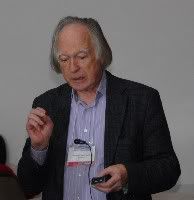In the first programme, Dawkins took on - in every sense - a group of teenage schoolchildren who, more power to their elbow, refused to give up the faiths that they held in differing degrees. In his birthplace of Kenya, he meditated on lion hunting antelope, and Darwin's famous example of the ichneumon wasp's larva eating a live caterpillar from the inside to posit the lack of a central authority: there's "no safety net".
This eve
 ning he returns to Kenya, to ask evangelical Bishop Bonifes Adoyo why the latter opposes evolution. The Bishop, tellingly, says he doesn't oppose evolution, merely an exhibition on human evolution being held next-door to his church; but he only gets a few seconds of air-time.
ning he returns to Kenya, to ask evangelical Bishop Bonifes Adoyo why the latter opposes evolution. The Bishop, tellingly, says he doesn't oppose evolution, merely an exhibition on human evolution being held next-door to his church; but he only gets a few seconds of air-time.Dawkins seems to be showing us his warm, fuzzy side by saying: "As a scientist, I'm thrilled by natural selection; as a human being, I abhor it" - in other words, and the theme of the show: "why should the fifth ape [humankind] 'love thy neighbour?'"
Dawkins, I think, is positing a dichotomy here - the "ruthless competition" of nature in "all its brutal glory" versus the society in which, witness the title of the extra chapter at the end of the 30th aniversary issue of The Selfish Gene, "nice guys finish first".
Perhaps Dawkins has a right to feel rather sensitive about the title of his first popular work, as The Selfish Gene is about the survival of any one gene as opposed to its allele, ie the gene opposite it in the double helix of DNA, and by extension the survival of the amino acid/protein that gene codes for, and way up the ladder the gene's expression in the phenotype (the organism's appearance and workings). In its original format the book finishes:
We have the power to defy the selfish gene of our birth and, if necessary, the selfish memes of our indoctrination. We can even discuss ways of deliberately cultivating and nurturing pure, disinterested altruism - something that has no place in nature, something that has never existed before in the whole history of the world. We are built as gene machines and cultured as meme machines, but we have the power to turn against our creators. We, alone on earth, can rebel against the selfish tyranny of the selfish replicators.(NB A "meme" is allegedly a societal version of a gene - a cultural replicator, eg the meme for the English language, the meme for religion, etc. However, although Dawkins claims in footnote 192 in the 30th anniv. edition of TSG that neurologist Juan Delius had discovered what a meme might look like and claims have since been made about "the cerebral basis of religious memes," personally I haven't heard much on the subject.)

So how would we "rebel against the selfish tyranny" of the gene? Dawkins suggests at the end of TSG30 that the most common way of doing this is contraception; but it occurs to me that contraception, as widely practiced and unfairly maligned as it may be, could be seen as a way to make the removal of what some might see as excess population competing for their kin's resources easy. Many supporters of contraception, as well as abortion, were members of the British Eugenics Society (now known as the Galton Institute): as national or international policy, birth control seems to be about controlling other folks' birth rates.
Another way to rebel seems to be altruism, although Dawkins explains in TSG how altruism can function as a method for prolonging the lives and therefore mating potential of one's kin (in other words gene-pool), even if one's own mating potential suffers. He's had problems with altruism over the years, and seems to reconcile himself with its presence in modern society - in the featured case in a soup-kitchen for street people - as a "misfiring" of genes that are meant to protect the mating potential of the tribal group, in a context wherein "tribes" are, theoretically, dissolved in the cosmopolitan soup. Indeed, in The God Delusion he refers to adoption, spending resources on a child who does not carry one's genes, as "a blessed misfiring" - others just call it blessed.
The problem for Dawkins seems to be that altruism's all good and well, but from the point of view of the survival of genes, much of it isn't necessary in this world where "Nature is a miserly accountant, grudging the pennies, watching the clock, punishing the smallest extravagance...Nature cannot afford frivolous jeux d'esprit." (The God Delusion, chapter 5) Indeed, the principles of kin-selection would justify not only genocide - like the Holocaust, Rwanda and Sudan - but also eugenics, both phenomena from which he is struggling to distance himself (perhaps being in the running for the Daily Telegraph National Treasures award is concentrating his mind). The programme wasted a few minutes of my life showing how a "nice guy" was the most popular donor in a sperm-bank, but this would again fall under the definition of kin-selection. If you want women you don't know to bear your progeny, you're hardly going to write a resumé saying "I hate everybody and kick puppies", are you?
There's no getting away from it: if your view of yourself and the world is one of fighting it out in a molecular battlefield (that nobody is sure Darwin could have lent his support to), this is going to affect your view of yourself and the world for the worse. For example, from last night's programme:
We are survival machines - vehicles for the genes inside us that are thrown away once the genes have been passed on...It is only genes that really survive. A gene that didn't look after its own interest wouldn't survive."
The anthropomorphic reference to the self-interested gene notwithstanding, this seems to be a reference to a passage at the end of chapter 2 of TSG, talking about how genes have gathered bodies around themselves:
Now they swarm in huge colonies, safe inside gigantic lumbering robots, sealed off from the outside world, communicating with it by tortuous indirect routes, manipulating it by remote control. They are in you and me; they created us, body and mind; and their preservation is the ultimate rationale of our existence. They have come a long way, those replicators. Now they go by the name of genes, and we are their survival machines.
R
 evd Keith Riglin of the United Reformed Church in another old fen introduced me to a dramatic reframing of the above statement by a fellow Oxonian. In the The Music of Life: Biology Beyond the Genome, Dennis Noble, Emeritus Professor of Cardiovascular Physiology at Balliol College, reverses the gene/organism polarity in favour of the organism:
evd Keith Riglin of the United Reformed Church in another old fen introduced me to a dramatic reframing of the above statement by a fellow Oxonian. In the The Music of Life: Biology Beyond the Genome, Dennis Noble, Emeritus Professor of Cardiovascular Physiology at Balliol College, reverses the gene/organism polarity in favour of the organism:Now they are trapped in huge colonies, locked inside highly intelligent beings, moulded by the outside world, communicating with it by complex processes, through which, blindly, as if by magic, function emerges. They are in you and me; we are the system that allows their code to be read; and their preservation is totally dependant on the joy we experience in reproducing ourselves. We are the ultimate rationale for their existence.
Am I right? Is Dawkins wrong? I don't know. All I can say is that I live in hope. Dawkins, it seems, now that he's handed on his genes and by his own words is ready to be thrown away, lives to shape his legacy before becoming, in Arthur Koestler's words at the end of Darkness at Noon, "a shrug of eternity".
Related posts
The Genius of Charles Darwin Part 1: the ichneumon delusion
The Genius of Charles Darwin Part 3: return of the ichneumon delusion











No comments:
Post a Comment
Please feel free to leave a comment - Frugal Dougal.